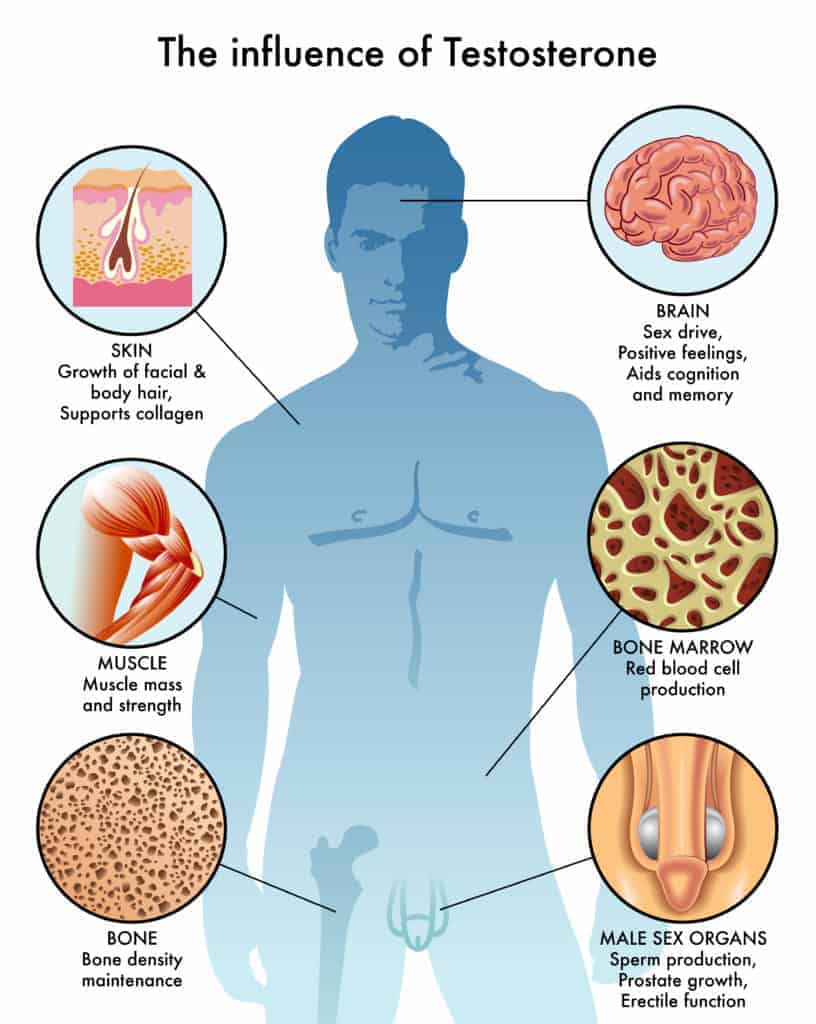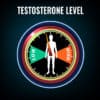Testosterone is a male dominant hormone that is produced and plays critical roles in Men’s health. Women also have Testosterone but in much smaller amounts. Shorter eating windows can increase Testosterone.
How does Fasting Increase my Testosterone?
Short periods of fasting cause your GnRH (Gonadotropin-releasing hormone), this is done by the brain sending signals down to your testicles to produce more testosterone.
Short durations of fasting can increase testosterone as well as your HGH (Human growth hormone) levels. There are some studies that show an increase in HGH levels by up to 200%!
To keep your Hormone levels optimal, eating in smaller tighter windows are best. The reason being is every time you eat, your testosterone levels are can drop.
Intermittent fasting also works by increasing your testosterone levels by improving your insulin sensitivity and lowering your blood sugar levels. Insulin sensitivity is essentially how sensitive the body’s cells respond to insulin.
If you have high insulin sensitivity, that is good because your body is able to use glucose more efficient and will cause your blood sugar to lower. On the other hand, if your sensitivity is low it’s what’s known as being insulin resistant. Insulin is another hormone and plays a role in testosterone levels.
Let’s face it guys we need our testosterone levels elevated, it’s not a meat headway of living. It affects your mental state and overall health.
Increasing your testosterone is more than improving your overall body aesthetics, it’s also about being healthier.
How fasting increases Testosterone
Naturally Increasing Testosterone Levels by Fasting
A study was done in non-obese men and showed the benefits of short term fasting and was able to raise the LH (Luteinizing-Hormone) a testosterone precursor up by 67%. There was an overall spike in regular Testosterone up to 180%! These are pretty big increases when you are talking about raising your levels naturally.
Why Skipping Breakfast may be Healthy
It’s always been pushed in our face that breakfast is the best time to eat and if you don’t it’s not healthy. this just simply does not seem to be the case. The reason being is because there is a relationship with insulin sensitivity and cortisol.
Cortisol is a stress hormone that isn’t all bad as it’s gotten a bad rap over time. However, when cortisol is elevated that’s not what we want. As mentioned cortisol’s role in the body is to respond to stress and regulates other resposnsibilities such as your immune system and metabolism.
Cortisol release is linked to your daily activity patterns known as your circadian rhythm. We don’t want to eat in the morning because most people work a daytime shift and upon waking that’s when your cortisol levels are cranked at their highest peak! As the day goes on your levels will begin to drop.
It doesn’t seem to make a lot of sense to eat upon waking regardless of the shift work you are doing. Your optimal time to burn fat is upon waking, this is because insulin levels are at the lowest and growth hormone levels are starting to climb.

Why Excess Fat will cause your Hormones to Plummet
If you are overweight or obese you can have an increased risk for low testosterone. Weight loss is one of the best routes to boosting testosterone. When you are overweight your body gets caught in a cycle, excess fat on your body will keep causing testosterone levels to drop and low testosterone will cause you to gain excess fat.
When you lose fat tissue you are putting the vicious cycle above to a halt. As the more fat, you burn the more efficient your body could produce testosterone. The study done below shows the correlation between fat loss and a rise in testosterone levels.
According to the European Society of Endocrinology “Out of 266 retrieved articles, 24 were included in the study. Of the latter, 22 evaluated the effect of diet or bariatric surgery, whereas two compared diet and bariatric surgery. Overall, both a low-calorie diet and bariatric surgery are associated with a significant (P<0.0001) increase in plasma sex hormone-binding globulin-bound and -unbound testosterone levels (total testosterone (TT)), with bariatric surgery being more effective in comparison with the low-calorie diet (TT increase: 8.73 (6.51–10.95) vs 2.87 (1.68–4.07) for bariatric surgery and the low-calorie diet, respectively; both P<0.0001 vs baseline). Androgen rise is greater in those patients who lose more weight as well as in younger, non-diabetic subjects with a greater degree of obesity. Body weight loss is also associated with a decrease in estradiol and an increase in gonadotropins levels. Multiple regression analysis shows that the degree of body weight loss is the best determinant of TT rise (B=2.50±0.98, P=0.029).”
What’s Fasting and the benefits of Healthy Testosterone
Does Fasting mean I have to Starve Myself
To start with fasting is not starving yourself, it’s an easier way of eating in a calorie deficit without having to constantly track your calories. While tracking calories is a good way of teaching yourself portion amounts, it’s not an ideal way to live.
People grossly underestimate how much they eat and overestimate how much they work out. I used to be the same way, even if you are eating organic and grass-fed meats you can still eat too many calories.
There are many ways to fast, it’s best to find what works best for you. The 16:8 method is probably the most popular. This is where you will eat in an 8 hour window and fast for 16 hours. You just skip breakfast and don’t eat until noon and stop eating at 8 pm.
It’s not as bad as it seems, once you get past the first 3-4 weeks it gets easier. You can have anything to drink like coffee, as long as you don’t add any calories!
Testosterone Health Benefits
- Increased Mood
- Stronger Bones
- Healthy Heart-Recent study on Testosterone Replacement Therapy involving 83,000 men who raised their T- levels were 24% less likely to have a heart attack and 36% less likely to experience a stroke.
- More Muscle and Less Fat
- Better Verbal and Memory Reasoning skills
- Stronger Libido
What are Sign of low Tetsosterone
- Low Sex Drive
- Difficulty in Maintaining and Erection
- Mood Changes
- Decreased Bone Mass
- Increase in Body Fat
- Fatigue
Testosterone affects everything from your ability to put on muscle, mental well-being, bone density, red blood cells, and fat storage. Your levels will increase as you grow into puberty but as you turn 30 it starts to decline by 1% every year.
What should my Tetsosterone Levels be at?
Normal levels for Testosterone should be between 300-1,000 nanograms per deciliter ng-dl. Testosterone levels in men have been dropping over the past few decades.
A recent study showed that testosterone replacement therapy in 2010-2013 increased by 50%! Some of the biggest contributors to lowered Testosterone is the current stress levels and the increase in obesity.
Ways to Naturally Increase Testosterone
Weight Lifting- While all forms of exercise may increase testosterone, weight lifting seems to be the most beneficial. It’s best to focus on compound movements and lift the most weight you can without sacrificing form. Exercises like bench press, squat, deadlift, standing overhead press, and pull-ups should be the staple of your workouts.
Nutrition-What you eat plays a big role in your testosterone levels. Eating enough protein is important because it can assist with weight loss and keep you feeling satiated. While healthy fats can play a role in increasing testosterone, it’s important to eat some carbs. Research shows that carbs have an effect on your T-levels positively. You need to find the right amount of macros to eat that works for you. Some doctors in the UK are prescribing walking outdoors as a prescription. There are many studies to show the improvement in mental well being and longevity.
Stress Reduction-High stress levels can wreak havoc on your hormones. Being chronically stressed can raise cortisol which can lower your testosterone. Doing things such as exercise, walking outdoors or hiking, meditation, breathing exercise, and laughter can reduce stress.
Vitamin D- Vitamin D supplements are thought to increase testosterone. Vitamin D is actually a hormone and not a vitamin for starters. In one 12 month study it found that vitamin D increased Testosterone by 25% when taken by 3,000 IU’s a day.
Sleep-One of the most underrated and probably has the biggest effect on your testosterone is getting enough sleep. At least 15% gets of adults get somewhere less than 5 hours of sleep a night. This is not good for your health and the rebuilding process of your body. A sleep-deprived young adult male can age as much as 10-15 years by being sleep deprived.
If you feel like you are deficient in testosterone it’s a good idea to go see your doctor and get tested. Generally, most doctors will test anyways to check your levels. It’s up to you to make the time to know where you stand. Especially for us guys over 30, we need to be doing all of the right things to have optimal levels.

